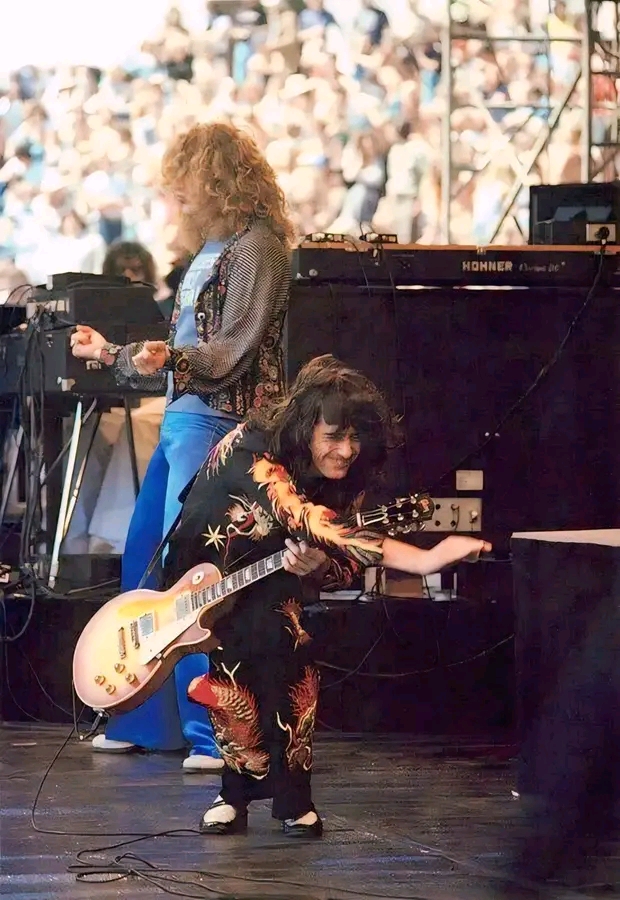Robert Plant and Jimmy Page, the iconic duo at the heart of Led Zeppelin, not only shared an undeniable musical brilliance but also a deep, multifaceted friendship that spanned decades of collaboration, growth, and occasional tension. Their partnership was fundamental to the success of the band and the creation of timeless music, and their personal relationship, both offstage and on, played a pivotal role in shaping the trajectory of rock history.
Page, the mastermind behind Led Zeppelin’s instrumental sound, and Plant, the charismatic and soulful lead vocalist, first crossed paths in 1968. Page had already established himself as a sought-after session guitarist and had envisioned a band that would push the limits of rock music. Plant, on the other hand, was a young, energetic vocalist with a powerful voice that could channel both mysticism and raw emotion. From the outset, there was a powerful chemistry between them. Plant’s passion and Page’s musical vision complemented each other, leading to a partnership that would not only change the face of rock but also foster a unique and often complex personal connection.
Throughout their time in Led Zeppelin, Plant and Page developed a creative synergy that was evident in the band’s groundbreaking music. Page’s virtuosity in guitar playing, combined with Plant’s soaring vocals and poetic lyrics, led to masterpieces such as “Stairway to Heaven,” “Kashmir,” and “Whole Lotta Love.” Their partnership was marked by a shared desire to push musical boundaries and experiment with new sounds, incorporating elements of blues, folk, Eastern influences, and hard rock. This innovative spirit drove them to create some of the most iconic albums in rock history, establishing Led Zeppelin as one of the genre’s defining acts.
However, their relationship wasn’t without its challenges. As the band’s success grew, so did the pressures of fame, personal lives, and creative differences. Both men had strong personalities, and tensions inevitably arose. Page was deeply focused on his musical vision, often driving the band’s direction with an almost obsessive commitment to detail and innovation. Plant, while equally passionate, had a more expansive view of their music, and his approach to songwriting was influenced by his personal experiences and his growing interest in spirituality and mythology.
Offstage, their relationship became strained at times. Plant’s evolving interests, including his travels to the Middle East and North Africa, began to shape his lyrics and approach to music, leading to some divergence in artistic vision between him and Page. Plant was also increasingly disillusioned with the pressures of fame and the grueling touring schedule, which contributed to his growing distance from Page. Despite this, they maintained a mutual respect for each other’s talents and contributions to the band, with both acknowledging that their individual strengths were vital to the band’s success.
Tragedy struck in 1977 when Plant’s son, Karac, died unexpectedly. This loss deeply affected Plant, and he struggled with the grief and emotional toll it took on him. During this period, the band’s dynamic changed further, as Plant became more introspective and less willing to continue the demanding tour schedule. Page, who was also battling his own personal demons, including struggles with substance abuse, understood Plant’s pain but was also focused on keeping the band together. Their relationship during this period was marked by a combination of empathy and unspoken tension, as both men navigated their personal turmoil while trying to keep the band intact.
By the time Led Zeppelin disbanded in 1980 following the death of drummer John Bonham, the friendship between Plant and Page had undergone a profound transformation. They both had been through personal struggles and had grown as individuals. Their relationship, though at times strained, had ultimately deepened through shared experiences and a mutual understanding of each other’s complexities.
In the years that followed, Robert Plant and Jimmy Page would occasionally reunite, collaborating on projects like their 1994 album No Quarter and their 2007 reunion concert at the O2 Arena in London. While their musical partnership was never quite the same as during Led Zeppelin’s prime, their shared history, respect, and love for the music they created together remained evident. Their friendship, marked by both collaboration and conflict, stands as a testament to the power of creative partnerships and the enduring legacy of Led Zeppelin.
